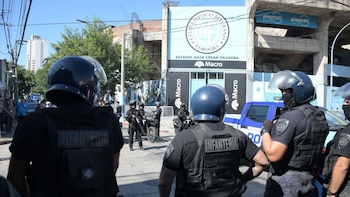They were criticized in 2015 for having closed their doors to migrants and refugees from the Middle East and Africa, and seven years later, the countries of Central Europe are hosting an unprecedented number of people who have fled the war in Ukraine.
In the last wave of migrants in 2015 that brought more than one million refugees to Europe, the countries of the so-called Visegrad group (Slovakia, Hungary, Poland and the Czech Republic) opposed the system implemented by the European Union to redistribute this flow of arrivals.
But since Russia attacked Ukraine on February 24, the four ex-communist countries, which were under Moscow's orbit until 1989, have spared no effort to help those fleeing the war.
Analysts cite the cultural, linguistic and geographical proximity to Ukraine to change this change in strategy, as well as the fact that the majority of new refugees are women and children.
“The situation is completely different today,” says sociologist Martin Buchtik, director of the Prague-based STEM institute.
Ukraine “is a culturally very close society to us, whereas people from the Middle East are far away and we don't have any experience of them, unlike Western countries,” he told AFP.
According to Buchtik, the impact caused by the war is an important factor.
“The situation has occurred here and now, and it has left no room for discussion. It's not for nothing that the first phase of a shocking phenomenon is called +heroic+,” he added.
More than three million Ukrainians fled to neighboring countries such as Slovakia, Hungary, Romania, Moldova and above all Poland, which alone has hosted nearly two million refugees.
Czech Republic, Hungary and Slovakia have received more than 200,000.
- The change compared to 2015 -
According to Grigorij Meseznikov, an analyst based in Bratislava, media coverage of the invasion also contributed to this change.
“The suffering of the Ukrainian people is so spectacular that it incites Slovaks to compassion towards Ukrainian refugees,” he said.
In 2015, the wave of migrants became a political challenge for the four countries, whose leaders were especially afraid of opposing voters, if they welcomed people fleeing other conflicts such as Syria or Afghanistan.
But today, the issue generates consensus among a population that has also suffered Moscow's oppression in the past.
Anna Materska-Sosnowska, political scientist at the University of Warsaw, points out that Poland's historical aversion to Russia plays its role, in line with the expression “the enemy of our enemy is our friend”.
“Polish society reacted well, and the government was forced to continue. Our cultural and linguistic proximity was important,” he told AFP.
According to her, “the fact that people see mainly women and children increases their compassion.”
The situation contrasts with what happened a few months ago, when the government ordered the construction of a fence on its border with Belarus to stop a significant flow of migrants from the Middle East that, according to Warsaw, was orchestrated by Minsk and Moscow.
In 2015, it was Hungarian Prime Minister Viktor Orban who stood out for his fierce opposition to the arrival of refugees and erected a fence on his border with Serbia.
- Double standards -
Even now, ultra-nationalist Orban distinguishes himself from the rest by his close ties with Russian President Vladimir Putin and his refusal to send weapons to Ukraine as defended by the European Union.
However, it has been favourable to the reception of Ukrainians, many of Hungarian origin, from the bordering region of Transcarpathia.
“Hungary will continue to help refugees and reject migration,” he said. “These are two different words in the Hungarian language. Migrants: stop. Refugees can get all the help” they need, he insisted, clearly.
“We are able to distinguish a migrant — who comes from the south (...) — from a refugee,” Orban added in a definition that does not conform to international law.
The United Nations describes refugees as persons “who are outside their country of origin for fear of persecution, conflict, widespread violence, or other circumstances that have seriously disrupted public order”.
The Czech sociologist Buchtik warns, however, that this perception may change in the context of the difficulties caused by the pandemic and the rise in energy and fuel prices.
“The change of mood will depend on the burden imposed on society. We don't know yet how many people will come and how many will stay.”
burs-frj/amj/sw/via/dbh/bl
Últimas Noticias
Debanhi Escobar: they secured the motel where she was found lifeless in a cistern
Members of the Specialized Prosecutor's Office in Nuevo León secured the Nueva Castilla Motel as part of the investigations into the case

The oldest person in the world died at the age of 119
Kane Tanaka lived in Japan. She was born six months earlier than George Orwell, the same year that the Wright brothers first flew, and Marie Curie became the first woman to win a Nobel Prize

Macabre find in CDMX: they left a body bagged and tied in a taxi
The body was left in the back seats of the car. It was covered with black bags and tied with industrial tape
The eagles of America will face Manchester City in a duel of legends. Here are the details
The top Mexican football champion will play a match with Pep Guardiola's squad in the Lone Star Cup

Why is it good to bring dogs out to know the world when they are puppies
A so-called protection against the spread of diseases threatens the integral development of dogs



